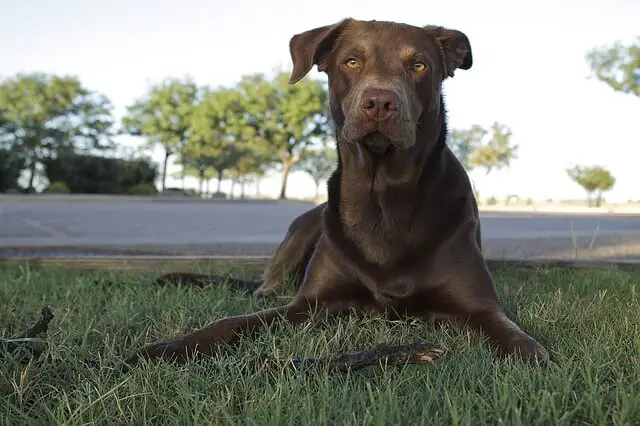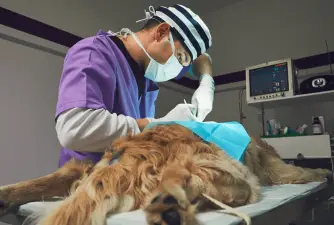Hemangiosarcoma in Dogs | Causes & treatment
28.11.2021.
Hearing your dog has any kind of cancer is devastating. However, some cancers are worse than others. Unfortunately, even with all the available modern medical research, we still don’t have a definite cure for cancer. One of those types of cancer is hemangiosarcoma in dogs. If your dog was diagnosed with it and you want to know more about it, we prepared the most critical information vets might want you to know. Here’s what you should know about hemangiosarcoma in dogs.
What is hemangiosarcoma in dogs?
Hemangiosarcoma is a type of cancer. More precisely, it is a malignant tumor of blood vessel lining cells. The biggest issue with this type of cancer is that it can happen anywhere on your dog’s body. Wherever there are blood vessels, hemangiosarcoma can develop. It is a fairly common type of cancer among dogs, and it is responsible for about 5% of cases.
How can I know if my dog has it?
If your dog wasn’t diagnosed with this type of cancer, but you suspect or worry it might have affected your dog, you’d want to know as soon as possible. However, if you’re not a veterinarian, knowing exactly what’s bugging your dog might be challenging. Most owners simply notice something’s wrong with their dog and take them to the vet. The best thing you can do as an owner is learning the symptoms and take your dog for an examination.

Hemangiosarcoma symptoms
Like every other disease in the world, it will cause clinical signs that will point vets and owners to hemangiosarcoma. If you want to know more about the clinical signs, here are the most common hemangiosarcoma symptoms;
- Anorexia
- Panting
- Internal bleeding
- Lethargy
- Collapse
- Sudden death
Another massive issue with this sneaky disease is that most owners don’t notice any symptoms. There are no classic symptoms because the disease can develop on all parts of the dog’s body.
VET TIP: In case your dog collapses, time becomes essential. A collapse usually points to internal bleeding, and you need to bring your dog for surgery as soon as possible. The bleeding mass should be removed, and the dog will need additional care.
What causes hemangiosarcoma in dogs?
There is another piece of bad news regarding hemangiosarcoma - we don’t know what causes it. Statistically, some breeds are more affected by it than others, which might mean it has a genetic component. Another bit of statistic tells us older dogs are affected more often. The most probable cause for cancer is a combination of hereditary and environmental risks that cause mutations that result in this particular type of cancer.
How do vets diagnose hemangiosarcoma?
If your dog started showing clinical signs of hemangiosarcoma, your vet should confirm the diagnosis. That usually happens when symptoms become very intense, and the owner simply cannot ignore them anymore. Here are some of the possible tests vets can perform to confirm hemangiosarcoma in dogs and decide how to proceed;
- Blood tests - Blood tests will tell your vet the exact cell numbers, blood clotting ability, organ functions, and other necessary information they need to prepare for surgery.
- X-rays - X-rays will help the vet determine the exact place where the tumor developed and if lungs and heart can undergo surgery.
- Physical examination - Some dogs might have developed hemangiosarcoma that can be located by palpation. The vet will perform a full physical to get all the information possible.
- Echocardiogram - Echocardiogram will tell the vet all they need to know about the dog’s heart health and function.
- CT scan - If the vet suspects a specific organ is affected, they can perform a CT scan and check the situation.

What breeds are affected?
Unfortunately, hemangiosarcoma can affect all dog breeds. However, certain breeds seem to be more prone to it than others. As we already mentioned, larger and older dogs are responsible for most cases. The 3 breeds most commonly affected by hemangiosarcoma are;
How is hemangiosarcoma in dogs treated?
The exact treatment will depend on the affected area. However, most hemangiosarcoma treatments involve spleen removal. That means that most cases of this type of cancer are located in the dog’s spleen. If that happens, the vet will perform a splenectomy. Unfortunately, the survival rate is not that great, and even dogs with a successful surgery survive 2 - 3 months on average.
The second part of hemangiosarcoma treatment is chemotherapy. If dogs haven’t shown any signs of metastasis and the chemotherapy is deployed in time, this can be a semi-effective way of delaying the tumor’s spread. Unfortunately, even with the best results, the average time a dog gets is 5 - 7 months.
Hemangiosarcoma in the heart
If the tumor develops on the dog’s heart, the immediate treatment will be determined by the area of the heart affected. If the tumor only affects the lining, it can be removed procedure called a pericardectomy. That procedure will keep the blood pumping normally. After the surgery, dogs should receive chemotherapy.

VET TIP: Many dog owners are worried about their dogs on chemotherapy. However, dogs react to chemo a lot better than we do. They can vomit occasionally, but most dogs won’t experience many other problems connected to this treatment.
Hemangiosarcoma on the skin
If the tumor is located on the skin, the dog should undergo surgery, and the affected area should be removed. After the initial surgical reaction, the dog should receive chemo to stop the spread of cancer.
What is the prognosis?
Hemangiosarcoma is one of the most aggressive types of cancer, and it is deadly. Even with the most successful treatments, the expected survival time of our furry companions is on average 5 - 7 months. Only about 10% of treated dogs live up to a year. While this is one of the worst diagnosis our dogs can get, we should pull ourselves together and make our companion’s life as comfy as possible. Show them affection and spend as much time with them as you can, because you can be sure they have gifted their whole love to you.
World Dog Finder team



![Best Dog DNA Tests [Most Accurate]](https://worlddogfinder.com/imager/334x225/upload/articles/mixed_dog_cloesup.jpg)



Share